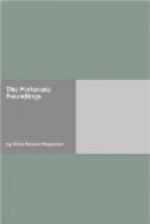DORILAUS.”
Impossible is it to conceive, without being in the very circumstances Horatio was, what a strange variety of mingled passions agitated his breast on having to read, and considered these letters:—to find such unhoped condescension from the baron de Palfoy and that Dorilaus was still living, and had the same, if not more tender inclinations for him than ever, the latter of which he had long since ceased to hope, was sufficient to have overwhelmed even the most phlegmatic person with an excess of joy:—but then the dark expressions in both these letters put his brain on the rack.—The baron had seemed to refer to an explanation of what he darkly hinted at in the letter of Dorilaus, but that he found rather more obsolete: he could imagine nothing farther than that Dorilaus having resolved to make him his heir, as he remembered some people said before he left England, on the knowledge of that intelligence the baron de Palfoy had consented to his marriage with mademoiselle Charlotta, and this, her being permitted to write to him confirmed.—This indeed was the supreme aim of his desires; and this it was that made him quit St. Germains, in hope of raising himself to a condition which might enable her to own her affection to him without a blush: but transporting as this idea was, it was mingled with disquiet, to reflect on the terms which both the Baron and Dorilaus seemed to insist on for the accomplishment of his wishes, tho’ he impatiently longed to see Dorilaus after so long an absence.—Tho’ in the possession of Charlotta all his hopes were centered, yet to leave a prince who had so highly favoured him, and under whose banners he had gained so much consideration, was a piece of ingratitude, which it was worse than death for him to be guilty of.—No! said he, it would be to render me unworthy of all the blessings they make me hope, should I purchase them on such conditions!—How can they demand them of me!—The Baron, Charlotta, and Dorilaus, have all of them the highest notions of honour, generosity and gratitude, and can they approve that in me, which I am certain they would not be guilty of themselves!—Sure it is but to try me, they seem to exact what they are sensible I cannot yield to, without the breach of every thing that can entitle me to esteem or love!




